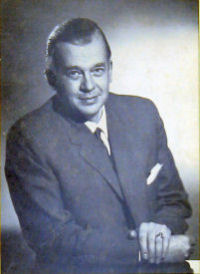E F Schumacher
| E.F. Schumacher | |
|---|---|

Photograph of Schumacher from the cover of Small Is Beautiful, 1973
|
|
| Born |
Ernst Friedrich Schumacher 19 August 1911 Bonn, German Empire |
| Died | 4 September 1977 (aged 66) Switzerland |
| Education |
University of Oxford Columbia University |
| Occupation | Economist |
Ernst Friedrich "Fritz" Schumacher (19 August 1911 – 4 September 1977) was a German statistician and economist who is best known for his proposals for human-scale, decentralised and appropriate technologies. He served as Chief Economic Advisor to the British National Coal Board for two decades, and founded the Intermediate Technology Development Group in 1966.
In 1995, his 1973 book Small Is Beautiful: A Study of Economics As If People Mattered was ranked by The Times Literary Supplement as one of the 100 most influential books published since World War II. In 1977 he published A Guide for the Perplexed as a critique of materialistic scientism and as an exploration of the nature and organisation of knowledge.
Schumacher was born in Bonn, Germany in 1911. His father was a professor of political economy. The younger Schumacher studied in Bonn and Berlin, then from 1930 in England as a Rhodes Scholar at New College, Oxford, and later at Columbia University in New York City, earning a diploma in economics. He then worked in business, farming and journalism. His sister, Elizabeth, was the wife of the physicist Werner Heisenberg.
Schumacher moved back to England before World War II, as he had no intention of living under Nazism. For a period during the War, he was interned on an isolated English farm as an "enemy alien". In these years, Schumacher captured the attention of John Maynard Keynes with a paper entitled "Multilateral Clearing" that he had written between sessions working in the fields of the internment camp. Keynes recognised the young German's understanding and abilities, and he was able to have Schumacher released from internment. Schumacher helped the British government mobilise economically and financially during World War II, and Keynes found a position for him at Oxford University.
...
Wikipedia
